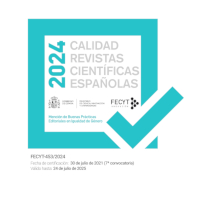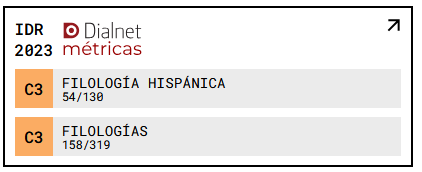Racismo And Gender Violence In “Biografía” De María Fernanda Ampuero
An Analysis Through the Theft of Enjoyment of the National-Thing
DOI:
https://doi.org/10.18172/cif.6687Keywords:
María Fernanda Ampuero, racism, gender violence, Thing, enjoyment, Ecuatorian literatureAbstract
The short story “Biografía” by the Ecuadorian writer María Fernanda Ampuero, portrays the experience of illegal migration from the point of view of a woman. She is triply vulnerable due to her status as a woman, a migrant and being undocumented, the protagonist must face racism and gender violence daily. This article reviews some of Slavoj Žižek's concepts such as Thing and enjoyment (jouissance) to explain racism as the improbable but no less frightening threat to the national-Thing. Although Ampuero's text is a fiction, it offers a unique opportunity to understand racism as a kind of castration complex where the “other” becomes a permanent threat to enjoyment.
Downloads
References
AGUILAR GÓNZALEZ, M. (2023). “Muertos vivientes y resignificaciones del mal patriarcal: escribir la violencia desde el gótico andino de María Fernanda Ampuero”. En Romano Hurtado, B. et al., (coords.), Neogótico latinoamericano en la literatura escrita por mujeres. Estudios críticos de obras representativas del siglo XXI. México, Editora Nómada, pp. 157-186. https://doi.org/10.47377/neogoticolat-cap5 DOI: https://doi.org/10.47377/neogoticolat-cap5
AMPUERO, M. F. (2013). Permiso de residencia, crónicas de la migración ecuatoriana a España. Ecuador, La Caracola Editores.
AMPUERO M. F. (2021). “Biografía”. Sacrificios humanos. México: Páginas de espuma, pp. 13-35.
BAUMAN, Z. (2005). Identidad. Buenos Aires, Losada.
FALCHI, GABRIELA. (2021). “Leer un libro aullando de dolor: sobre Sacrificios humanos de María Fernanda Ampuero”. Tenso diagonal, 12, 312-316.
FUENTES KRAFFCZYK, F. O. (2024). “Enfermedad, trauma y memoria en las narcoficciones gallegas”. Revista 452F, 31, 98-109. https://doi.org/10.1344/452f.2024.31.6 DOI: https://doi.org/10.1344/452f.2024.31.6
FUENTES KRAFFCZYK, F. O. (2023). “Tres tesis sobre las narcoficciones gallegas”. Revista Aisthesis, 73, 182-194. https://doi.org/10.7764/Aisth.73.9 DOI: https://doi.org/10.7764/Aisth.73.9
GÁNDARA RODRÍGUEZ, M. (2025). “Cuerpos que resisten: Le viste la cara a Dios de Gabriela Cabezón Cámara y “Biografía” de María Fernanda Ampuero”. Arte imagen y sonido, 5 (9), 1-15. https://doi.org/10.33064/9ais7729 DOI: https://doi.org/10.33064/9ais7729
FARIAS BOTELHO, F. (2024). “O terror de mulheres imigrantes em “Biografia”, de María Fernanda Ampuero” en Anais do XI Seminário Internacional Literatura e Cultura. Sao Paulo, Tuxped Serviços Editoriais, pp. 385-396.
MARCOS, I. (2024). “Liminalidad en lo insólito. La mujer migrante en la narrativa corta de Mariana Enríquez y Ma. Fernanda Ampuero”. Crisol, 33, 1-24.
ŽIŽEK, S. (2011). “¡Disfruta a tu país como a ti mismo!”. En Žižek, S., El acoso de las fantasías. México, Siglo XXI, pp. 43-75.
Downloads
Published
How to Cite
Issue
Section
License
Copyright (c) 2025 Felipe Oliver Fuentes Kraffczyk

This work is licensed under a Creative Commons Attribution 4.0 International License.
The authors retain copyright of articles and authorize CIF the first publication. They are free to share and redistribute the article without obtaining permission from the publisher as long as they give appropriate credit to the editor and the journal.
Self-archiving is allowed too. In fact, it is recommendable to deposit a PDF version of the paper in academic and/or institutional repositories.
It is recommended to include the DOI number.
This journal is licensed under a Creative Commons Attribution 4.0 International License














